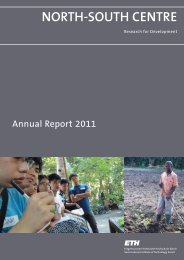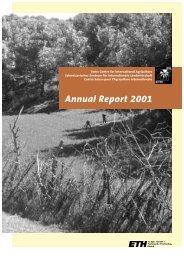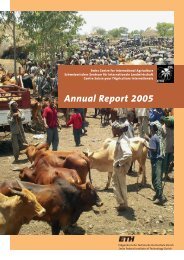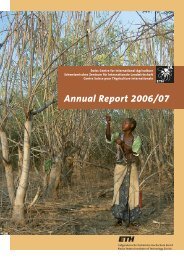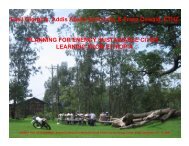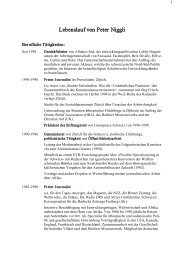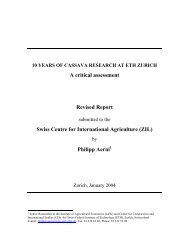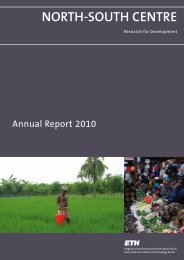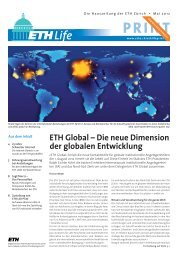NORTH-SOUTH CENTRE - ETH - North-South Centre North-South ...
NORTH-SOUTH CENTRE - ETH - North-South Centre North-South ...
NORTH-SOUTH CENTRE - ETH - North-South Centre North-South ...
Create successful ePaper yourself
Turn your PDF publications into a flip-book with our unique Google optimized e-Paper software.
Moving in a dynamic environment<br />
Beyond the ongoing research collaboration and capacity development programmes, the<br />
main activity of the <strong>North</strong>-<strong>South</strong> <strong>Centre</strong> in 2009 was the development of our strategy.<br />
Throughout the year, we maintained high internal and external visibility by organising<br />
events, being present in fora, and communicating via our established tools. A new<br />
and promising experience for us is negotiating with non-traditional funding agencies.<br />
One of the encouraging developments in 2009 was the<br />
steadily growing number and disciplinary breadth in membership.<br />
At the end of the year, we had more than 100 members<br />
from 10 out of 16 departments, including some 50<br />
active and retired professors. This is equivalent to approximately<br />
10% of all <strong>ETH</strong> professors. Thus, the <strong>North</strong>-<strong>South</strong><br />
<strong>Centre</strong> is well represented among the <strong>ETH</strong> faculty. The research<br />
and teaching commitment of our members is the<br />
bulk of activities of the <strong>North</strong>-<strong>South</strong> <strong>Centre</strong>. While this<br />
chapter focuses on the strategic and management perspectives<br />
of our programme, these activities are portrayed in the<br />
respective chapters of this report.<br />
Smooth governance and management<br />
The governance structures proved fully functional. When<br />
the President of the <strong>North</strong>-<strong>South</strong> <strong>Centre</strong> was on a sabbatical<br />
abroad, the two vice-presidents continued to lead the <strong>Centre</strong><br />
Barbara Becker, Managing Director<br />
of the <strong>North</strong>-<strong>South</strong> <strong>Centre</strong><br />
smoothly. The Steering Committee met three times,<br />
thereof once specifically to approve the new strategy. The<br />
General Assembly took place in conjunction with the Annual<br />
Conference in September. It elected Stefanie Engel (D-UWIS)<br />
as new vice-president to replace Renate Schubert (D-GESS)<br />
who continues to serve on the Steering Committee.<br />
The management team remained constant until December<br />
2009 when Emma Lindberg joined to support us for the<br />
three-day conference “Tropentag”, which will be organised at<br />
the <strong>ETH</strong> Zurich in 2010. When Isabelle Gómez announced<br />
that she would start her new career in the diplomatic service<br />
of Switzerland, Emma Lindberg accepted to take over her<br />
portfolio from March 2010. In July, the management office<br />
moved to new premises in Hochstrasse 60a, higher up on the<br />
“Zürichberg”. One advantage of the new location is the immediate<br />
vicinity to NADEL. Another advantage is the quiet<br />
environment and the building informally called “<strong>North</strong>-<br />
<strong>South</strong> studio”, which further supports our good teamwork.<br />
New strategy<br />
In 2008, it became apparent that the business plan of 2006<br />
needed to be complemented with a mid- to long-term<br />
strategy. Consequently, the Steering Committee started a<br />
strategy process by appointing a strategy taskforce. The process<br />
was supported by Jürg Krummenacher (BHP – Brugger<br />
und Partner Ltd.) as external consultant and involved the<br />
members, the management team and external stakeholders.<br />
This process occupied us throughout the entire year,<br />
until the resulting strategy was approved in November 2009.<br />
The strategy positions us much more clearly than before in<br />
the <strong>ETH</strong>-internal environment and among our Swiss peers.<br />
In addition, our four new research areas “Food security”,<br />
“Natural resource management”, “Urban and rural transformation”,<br />
and “Technology and infrastructure” cover a broad<br />
range of disciplinary strengths, cutting across the majority<br />
of <strong>ETH</strong> departments. The strategy is presented in more detail<br />
in a separate chapter (see p. 8).<br />
5<br />
Profile<br />
A word from the Managing Director




